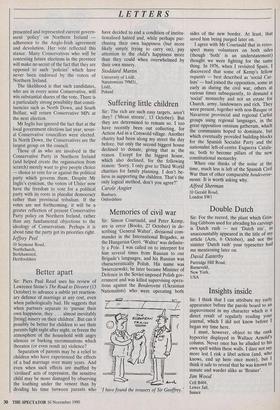Memories of civil war
Sir: Simon Courtauld, and Peter Kemp, are in error (Books, 27 October) in de- scribing 'General Walter', divisional com- mander in the International Brigades, as the Hungarian Ger& `Walter' was definite- ly a Pole. I was called on to interpret for him several times from Russian to our Brigade's languages, and his Russian was characteristically Polish. His name was Swierczewski; he later became Minister of Defence in the Soviet-imposed Polish gov- ernment and was killed supervising opera- tions against the Benderovtsi (Ukrainian Nationalists) who were operating both `I have found the trousers of Sir Geoffrey.' sides of the new border. At least, that saved him being purged later on.
I agree with Mr Courtauld that in retro- spect many volunteers on both sides (though `both' is an understatement) thought we were fighting for the same thing. In 1976, when I revisited Spain, I discovered that some of Kemp's fellow requetes — best described as `social Car- lists' — had joined the opposition, some as early as during the civil war, others at various times subsequently, to demand a `social' monarchy and not an estate for Church, army, landowners and rich. They were present, together with non-Basque or Navarrese provincial and regional Carlist groups using regional languages, in the great opposition omnium gatherum, which the communists hoped to dominate, but which eventually provided building-blocks for the Spanish Socialist Party and the nationalist left-of-centre Esquerra Catala- na, both to become pillars of the new constitutional monarchy.
When one thinks of the noise at the time, much less is left of the Spanish Civil War than of other comparable bouleverse- ments. It is worth asking why.
Alfred Sherman
10 Gerald Road, London SW1


































































 Previous page
Previous page